- Clone
- A20 (See other available formats)
- Regulatory Status
- RUO
- Other Names
- T200, Ly-5.1, LCA
- Isotype
- Mouse (A.SW) IgG2a, κ
- Barcode Sequence
- CCTATGGACTTGGAC
| Cat # | Size | Price | Quantity Check Availability | ||
|---|---|---|---|---|---|
| 110757 | 10 µg | $369.00 | |||
CD45.1 is an alloantigen of CD45, expressed by Ly5.1 bearing mouse strains (e.g., RIII, SJL/J, STS/A, DA). CD45, a member of the protein tyrosine phosphatase (PTP) family, is a 180-240 kD glycoprotein expressed on all hematopoietic cells except mature erythrocytes and platelets. There are multiple isoforms in mice that play key roles in TCR and BCR signal transduction. These isoforms are very specific to the activation and maturation states of the cell as well as specific cell types. The primary ligands for CD45 are galectin-1, CD2, CD3, CD4, TCR, CD22, and Thy-1.
Product Details
- Verified Reactivity
- Mouse
- Antibody Type
- Monoclonal
- Host Species
- Mouse
- Immunogen
- SJL mouse thymocytes and splenocytes
- Formulation
- Phosphate-buffered solution, pH 7.2, containing 0.09% sodium azide and EDTA
- Preparation
- The antibody was purified by chromatography and conjugated with TotalSeq™-C oligomer under optimal conditions.
- Concentration
- 0.5 mg/ml
- Storage & Handling
- The antibody solution should be stored undiluted between 2°C and 8°C. Do not freeze.
- Application
-
PG - Quality tested
- Recommended Usage
-
Each lot of this antibody is quality control tested by immunofluorescent staining with flow cytometric analysis and the oligomer sequence is confirmed by sequencing. TotalSeq™-C antibodies are compatible with 10x Genomics Chromium Single Cell Immune Profiling Solution.
To maximize performance, it is strongly recommended that the reagent be titrated for each application, and that you centrifuge the antibody dilution before adding to the cells at 14,000xg at 2 - 8°C for 10 minutes. Carefully pipette out the liquid avoiding the bottom of the tube and add to the cell suspension. For Proteogenomics analysis, the suggested starting amount of this reagent for titration is ≤ 1.0 µg per million cells in 100 µL volume. Refer to the corresponding TotalSeq™ protocol for specific staining instructions.
Buyer is solely responsible for determining whether Buyer has all intellectual property rights that are necessary for Buyer's intended uses of the BioLegend TotalSeq™ products. For example, for any technology platform Buyer uses with TotalSeq™, it is Buyer's sole responsibility to determine whether it has all necessary third party intellectual property rights to use that platform and TotalSeq™ with that platform. - Application Notes
-
The A20 antibody does not react with leukocytes or mouse cells expressing the CD45.2 alloantigen. Additional reported applications (for relevant formats of this clone) include: immunoprecipitation3, in vitro blocking of B cell responses1,2, immunohistochemical staining of frozen sections: OCT embedded7 and acetone-fixed4-6 (direct immunofluorescence detection with fluorochrome conjugated A20 was used in (5) and (6)).
- Additional Product Notes
-
TotalSeq™ reagents are designed to profile protein levels at a single cell level following an optimized protocol similar to the CITE-seq workflow. A compatible single cell device (e.g. 10x Genomics Chromium System and Reagents) and sequencer (e.g. Illumina analyzers) are required. Please contact technical support for more information, or visit biolegend.com/totalseq.
The barcode flanking sequences are CGGAGATGTGTATAAGAGACAGNNNNNNNNNN (PCR handle), and NNNNNNNNNCCCATATAAGA*A*A (capture sequence). N represents either randomly selected A, C, G, or T, and * indicates a phosphorothioated bond, to prevent nuclease degradation.
View more applications data for this product in our Scientific Poster Library. -
Application References
(PubMed link indicates BioLegend citation) -
- Yakura H, et al. 1983. J. Exp. Med. 157:1077. (Block)
- Yakura H, et al. 1986. J. Immunol. 136:2729. (Block)
- Shen FW, et al. 1986. Immunogenetics 24:146. (IP)
- Suzuki K, et al. 2000. Immunity 13:691. (IHC-F)
- Werner N, et al. 2002. Arterioscler. Thromb. Vasc. Biol. 22:1567. (IHC-F)
- Lessner SM, et al. 2002. Am. J. Pathol. 160:2145. (FC, IHC-F)
- Chen CC, et al. 2005. P. Natl. Acad. Sci. USA 102:11408 (IHC-F)
- Pascal V, et al. 2007. J. Immunol. 179:1751. (FC)
- Mende I, et al. 2006. Blood 107:1383. (IHC-F, FC)
- Phan TG, et al. 2007. Nature Immunol. 8:992. (FC)
- Wither DR, et al. 2009. J. Immunol. 183:5079. PubMed
- Pascal V, et al.2007. J. Immunol. 179:1751. PubMed
- Lee SW, et al. 2009. J. Immunol. 182:6753. PubMed
- Takada K, et al. 2009. J. Exp Med. 206:2253. PubMed
- Beamer CA, et al. 2007. Am. J. Respir. Cell. Mol. Biol. 37:729. (FC) PubMed
- Li LX, et al. 2010. J. Immunol. 184:1728. PubMed
- Hosoi A, et al. 2008. Cancer Res. 68:3941. (FC) PubMed
- Kenna TJ, et al. 2008. Blood 111:2091. PubMed
- Kohlmeier JE, et al. 2008. Immunity. 29:101. (FC) PubMed
- RRID
-
AB_2819824 (BioLegend Cat. No. 110757)
Antigen Details
- Structure
- Protein tyrosine phosphatase (PTP) family, 180-240 kD
- Distribution
-
All hematopoietic cells except mature erythrocytes and platelets of the CD45.1 strain of mice
- Function
- Phosphatase, T and B cell activation
- Ligand/Receptor
- Galectin-1, CD2, CD3, CD4
- Biology Area
- Cell Biology, Immunology, Inhibitory Molecules, Neuroscience, Neuroscience Cell Markers
- Molecular Family
- CD Molecules
- Antigen References
-
1. Barclay A, et al. 1997. The Leukocyte Antigen FactsBook Academic Press.
2. Trowbridge IS, et al. 1993. Annu. Rev. Immunol. 12:85.
3. Kishihara K, et al. 1993. Cell 74:143.
4. Pulido R, et al. 1988. J. Immunol. 140:3851. - Gene ID
- 19264 View all products for this Gene ID
- UniProt
- View information about CD45.1 on UniProt.org
Other Formats
View All CD45.1 Reagents Request Custom ConjugationCompare Data Across All Formats
This data display is provided for general comparisons between formats.
Your actual data may vary due to variations in samples, target cells, instruments and their settings, staining conditions, and other factors.
If you need assistance with selecting the best format contact our expert technical support team.
-
Biotin anti-mouse CD45.1
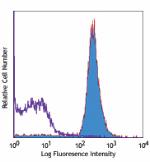
SJL mouse splenocytes stained with biotinylated A20, followe... -
FITC anti-mouse CD45.1
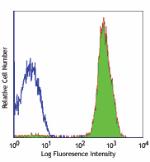
SJL mouse splenocytes stained with A20 FITC -
PE anti-mouse CD45.1
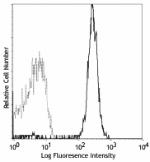
SJL (solid line) and C57BL/6 (broken line) splenocytes stain... -
Purified anti-mouse CD45.1
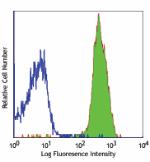
SJL mouse splenocytes stained with purified A20, followed by... -
APC anti-mouse CD45.1
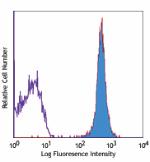
SJL mouse splenocytes stained with A20 APC -
APC/Cyanine7 anti-mouse CD45.1
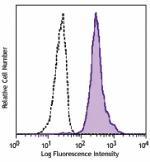
SJL mouse splenocytes were stained with CD45.1 (clone A20) A... -
Alexa Fluor® 488 anti-mouse CD45.1
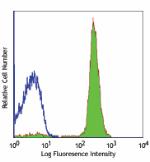
SJL mouse splenocytes stained with A20 Alexa Fluor® 488 -
Alexa Fluor® 647 anti-mouse CD45.1
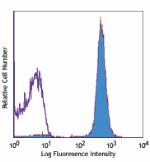
SJL mouse splenocytes stained with A20 Alexa Fluor® 647 -
Pacific Blue™ anti-mouse CD45.1
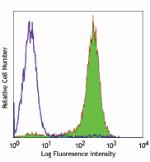
SJL mouse splenocytes stained with A20 Pacific Blue™ -
Alexa Fluor® 700 anti-mouse CD45.1
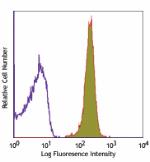
SJL mouse splenocytes stained with A20 Alexa Fluor® 700 -
Brilliant Violet 650™ anti-mouse CD45.1
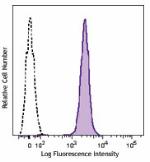
SJL mouse splenocytes were stained with CD45.1 (clone A20) B... -
PerCP anti-mouse CD45.1
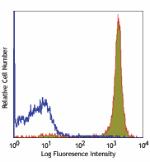
SJL mouse splenocytes stained with A20 PerCP -
PerCP/Cyanine5.5 anti-mouse CD45.1
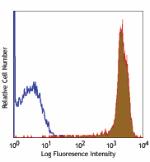
SJL mouse splenocytes stained with A20 PerCP/Cyanine5.5 -
PE/Cyanine7 anti-mouse CD45.1
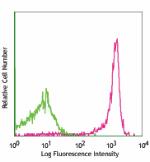
SJL splenocytes stained with A20 PE/Cyanine7 -
Brilliant Violet 421™ anti-mouse CD45.1
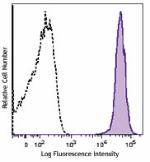
SJL mouse splenocytes were stained with CD45.1 (clone A20) B... 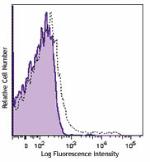
C57BL/6 mouse splenocytes were stained with CD45.1 (clone A2... -
Brilliant Violet 570™ anti-mouse CD45.1
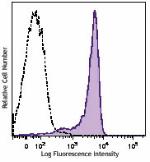
SJL mouse splenocytes were stained with CD45.1 (clone A20) B... -
Brilliant Violet 605™ anti-mouse CD45.1
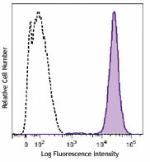
SJL mouse splenocytes were stained with CD45.1 (clone A20) B... -
Brilliant Violet 711™ anti-mouse CD45.1
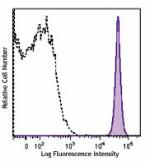
SJL mouse splenocytes were stained with CD45.1 (clone A20) B... -
Brilliant Violet 510™ anti-mouse CD45.1
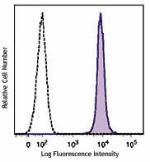
SJL mouse splenocytes were stained with CD45.1 (clone A20) B... -
Brilliant Violet 785™ anti-mouse CD45.1
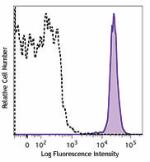
SJL mouse splenocytes were stained with CD45.1 (clone A20) B... -
Purified anti-mouse CD45.1 (Maxpar® Ready)
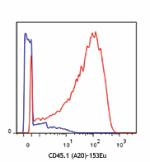
NOD (red) and C57BL/6 (blue) mouse splenocytes stained with ... -
PE/Dazzle™ 594 anti-mouse CD45.1
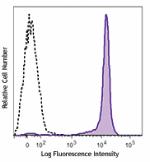
SJL mouse splenocytes were stained with CD45.1 (clone A20) P... -
Alexa Fluor® 594 anti-mouse CD45.1
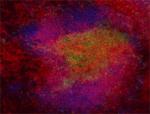
SJL mouse frozen spleen section was fixed with 4% paraformal... -
APC/Fire™ 750 anti-mouse CD45.1
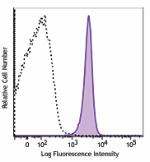
SJL mouse splenocytes were stained with CD45.1 (clone A20) A... -
TotalSeq™-A0178 anti-mouse CD45.1
-
TotalSeq™-B0178 anti-mouse CD45.1
-
TotalSeq™-C0178 anti-mouse CD45.1
-
Spark UV™ 387 anti-mouse CD45.1

SJL mouse splenocytes were surface stained with anti-mouse C... -
Spark Blue™ 550 anti-mouse CD45.1 (Flexi-Fluor™)
-
Spark Red™ 718 anti-mouse CD45.1 (Flexi-Fluor™)
-
Spark Blue™ 574 anti-mouse CD45.1 (Flexi-Fluor™)
